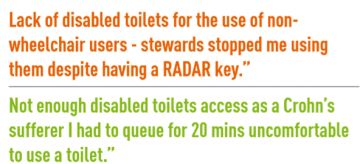Fire regs need tightening
Recent industry developments and the need for a systemic change in fire regulations...
Recent industry developments and the need for a systemic change in fire regulations...
 Spectator enjoyment – it’s about more than the game
Spectator enjoyment – it’s about more than the gameWatching sport is an exciting and immersive experience. And in our view, this is about more than just the game itself: sports ground accessibility is key to making the experience accessible and inclusive to all. So what can operators do to ensure this is the case?
The fan experience goes beyond the sporting contest itself, encompassing planning visits, buying tickets, travelling to and from games, buying merchandise, eating, drinking and socialising. The challenge is to make the whole experience easy for spectators and visitors to participate in.
Imagine being unable to book a ticket to see your favourite team play, because you can’t read the text on the online booking form. Or arriving at the venue and not being able to easily reach your seat, because you can’t navigate the steps up to the stand, and there’s no alternative access route.
These are just two common real world examples, that demonstrate how sports ground accessibility needs to improve. There’s still a long way to go to ensure that supporters who are disabled, elderly or who have temporary injuries or ill health, are able to support their teams as easily as the next person.
Disabled people share their experiences…
“Difficulty travelling to and from using public transport”
“Not enough disabled coaches supplying transport”
“Lack of parking for blue badge holders”
There are 14.1 people in the UK living with a disability; 7 million with mobility impairments, 3.5 million people with dexterity impairments, 1.9 million with hearing impairments and 1.7 million with visual impairments. It is safe to assume that many of these people would like to attend sports events.
Under the Equality Act 2010, service providers and public venues must anticipate the needs of disabled customers. Those responsible for sports grounds need to be proactive, identifying and removing barriers to accessibility – not waiting for those at a disadvantage to complain.
Accessible Stadia


Not surprisingly perhaps, money is an issue when it comes to improving accessibility. Reports have also found that clubs and venues doubted their own level of competency and awareness on accessibility standards and requirements. Additionally, there are concerns that accessibility is not high enough on the agenda when it comes to allocating available funding.
Of course, many sports venues pre-date today’s accessibility legislation and guidance. Some of them were constructed over 100 years ago, when we did not fully understand the needs of disabled people, and certainly before equality became the important topic that it is today. However ‘reasonable adjustments’ do not mean knocking down premises and starting again – there are other things that can be done to improve accessibility.
Many clubs and venues could make simple adjustments to improve accessibility, without investing large sums. These could include:
It’s also important that disabled visitors can easily access other information relating to the venue. For example: local transport connections and planned transport engineering work; car parking facilities; walking routes and distances; details of step-free access routes; and the time needed to exit the stadium, will all help create a better experience.
At System Concepts, we offer a range of support to help venue operators and and clubs improve sports ground accessibility. Contact us to find out more about how we can help.

Recent industry developments and the need for a systemic change in fire regulations...
Recent industry developments and the need for a systemic change in fire regulations...
How employers can cost effectively meet their legal obligations – and access great talent...
How employers can cost effectively meet their legal obligations – and access great talent...
Christian Harris from Slip Safety Services explains how businesses can protect themselves against slip risks...
Christian Harris from Slip Safety Services explains how businesses can protect themselves against slip risks...